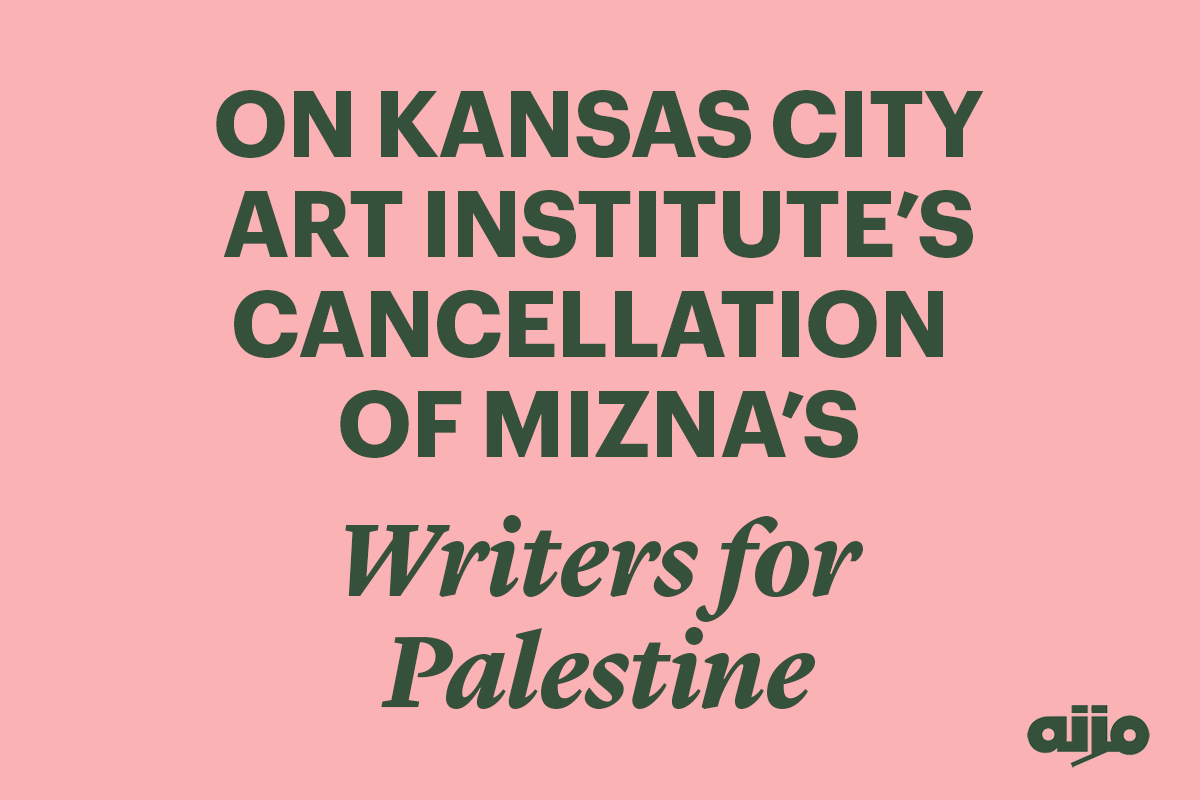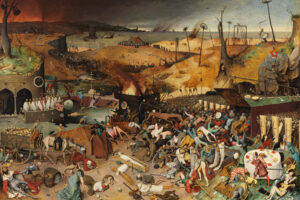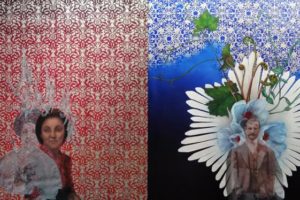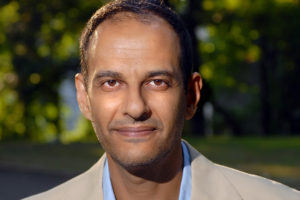
May 3, 2024
On Kansas City Art Institute’s Cancellation of Mizna’s “Writers for Palestine”
May 4, 2024
Read our follow-up statement from May 8, 2024 below.
We condemn Kansas City Art Institute’s (KCAI) unilateral cancellation of Mizna’s event, “Writers for Palestine,” a literary reading originally scheduled to be held at KCAI on February 7, 2024 as an independent event during, but unaffiliated with, the 2024 Association of Writers and Writing Programs Conference in Kansas City.
“Writers for Palestine” was organized to center Palestinian voices at a moment when Palestinians are being exterminated. We see it as imperative to provide spaces for global solidarity when, nationwide, institutions systematically censor both Palestinians and advocacy for Palestinian liberation. Often, censorship takes the form of “security concerns,” weaponizing the language of safety against vulnerable marginalized communities. On February 2, 2024, two business days before the “Writers for Palestine” event, KCAI rescinded its hosting agreement due to security concerns.
This cancellation uses a marginalized community’s need to have open, honest dialogue about safety as a tool to erase marginalized voices. KCAI had received more than two weeks’ notice of the event, but staff failed to bring forward any concerns or any viable options for how to ensure a safe event, as part of any collaborative conversations. This demonstrates, at best, ignorance of how to engage with marginalized communities about their lived realities and, at worst, outright discrimination.
Southwest Asian and North African writers are not alone in living in the United States as a community under attack. Every institution—and especially an institution that prides itself on its ability to “address the critical issues of Inclusion, Diversity, Equity, Access, and Sustainability across all facets of the Institution”—must be prepared to discuss how to protect Black and Brown community members. Otherwise, that institution is complicit in exclusion, censorship, and silencing of marginalized voices.
—
Timeline of events
On January 11, 2024, Mizna contacted KCAI event staff to inquire about potential venues for “Writers for Palestine.” Without first-hand knowledge of local dialogue about Palestine, we raised the question of what would be necessary to ensure the safety of our artists, audience, and the surrounding community in the hypothetical case of anti-Palestinian threats. We performed further due diligence by contacting local organizations with direct experience hosting Palestinian events. Having learned that Palestinian speakers have not typically received negative backlash in the city, Mizna made the decision that KCAI campus security would sufficiently and ethically ensure safety of all involved parties. At each stage of this important dialogue, we collaborated with the KCAI staff event member assigned to us as an institutional representative. On January 31, 2024, having received satisfactory answers to and agreements regarding all logistical matters and concerns, Mizna sent the signed venue-agreement contract back to KCAI and initiated payment for rental fees.
However, on February 2, 2024, Mizna received an email from Jane Preuss, Executive Vice President, General Counsel of KCAI, unilaterally canceling the event, citing concerns raised “about safety during the Event due to individuals who might engage in violent behavior.” As per Preuss, these “safety concerns” necessitated further, “appropriate security,” for which the venue could not arrange within the necessary timeframe. This is despite the fact that initial inquiry for the event, including security questions, had been raised in mid-January of the same year. KCAI also asserted that Mizna had not paid for the space ten days prior to the event (by January 29), a stipulation of the KCAI rental agreement.
Upon receipt of this email, a Mizna staff member spoke to Preuss, assuring Preuss that payment had been initiated and that KCAI event staff had not described January 29 as a firm deadline. In that phone conversation, the Mizna staff member explained that, after careful consideration, “Writers for Palestine” Mizna organizers decided that anti-Palestinian harm from the external community did not pose a threat, prompting Mizna to utilize KCAI’s on-campus security as well as the security volunteers, trained in de-escalation, to ensure safety for the event participants and the larger KCAI community. Preuss responded that, nonetheless, the (hypothetical) threat of violence at the event necessitated armed security in the form of off-duty police, which was not an option given the event’s upcoming date and that no available path existed for holding the event at KCAI.
—
May 8, 2024—On KCAI’s Response to Mizna’s May 4 Statement
On Tuesday, May 7, the Kansas City Art Institute (KCAI) responded to Mizna’s public account of the institute’s silencing of Palestinian voices via a private email to alumni and students. Within that email, KCAI misconstrues the events surrounding their decision to retract a venue agreement for Mizna’s “Writers for Palestine” event, which was to be held at KCAI on February 7. In responding privately to a public account, KCAI excludes those it has directly harmed. This choice indicates an organization that wishes to control the narrative rather than one that wants to make amends and take accountability.
In its email, KCAI told students that in response to Mizna’s questions about the level of security necessary to ensure safety at its event, KCAI “provided Mizna with an alternative security solution.” The statement is patently false. Before Mizna signed the event agreement, KCAI never raised any question about security. During the conversation in which Jane Preuss, Executive Vice President and General Counsel, retracted the agreement on the basis of “security concerns,” Preuss communicated that no viable options or solutions existed for holding the event.
KCAI stated in its email to students that the organization is “always willing to engage with community partners to explore safe ways for groups to have important conversations about sensitive global issues.” According to the email “KCAI is dedicated to ensuring our campus remains an inclusive setting for robust artistic expression and cultural dialogue.” Yet, as of today, KCAI continues to refuse to engage directly with those marginalized people it has harmed or to publicly acknowledge that harm.
Alumni and students have joined Mizna in condemning the cancellation of “Writers for Palestine” and demanding a public apology. We stand in solidarity with their protest actions, including a public protest to be held today, May 8. They have written a public petition, which can be found at bit.ly/kcai-open-letter. We urge KCAI to learn the difference between meaningful atonement and performative self-protectionism. We also urge KCAI to understand the compounded harm, grief, and labor it is inflicting by withholding accountability at a critical global moment when Rafah is under siege.












